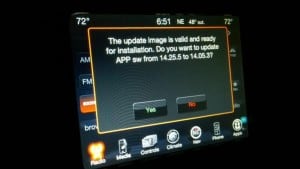 Car owners are officially allowed to hack, repair and modify their car software according to the US Copyright Office that granted an exemption in copyright law. The exemption also allows researchers to hack into code to see what is going on. The Electronic Frontier Foundation (EFF) contends that the VW diesel scandal hid its malicious code which could had been found by researchers.
Car owners are officially allowed to hack, repair and modify their car software according to the US Copyright Office that granted an exemption in copyright law. The exemption also allows researchers to hack into code to see what is going on. The Electronic Frontier Foundation (EFF) contends that the VW diesel scandal hid its malicious code which could had been found by researchers.
The Librarian of Congress, upon the recommendation of the Register of Copyrights, has adopted exemptions to the DMCA’s statutory prohibition against circumvention of technological measures that control access to copyrighted works in 17 U.S.C. 1201(a)(1).
Altering the code or programs on the software does not infringe upon the automakers claims that the software was protected under the Digital Millennium Copyright Act. The office concluded that altering the code that runs electronic control units “for the purposes of facilitating diagnosis, repair and modification of vehicles” was permitted under the law.
“Computer programs that are contained in and control the functioning of a motorized land vehicle such as a personal automobile, commercial motor vehicle or mechanized agricultural vehicle, except for computer programs primarily designed for the control of telematics or entertainment systems for such vehicle, when circumvention is a necessary step undertaken by the authorized owner of the vehicle to allow the diagnosis, repair or lawful modification of a vehicle function; and where such circumvention does not constitute a violation of applicable law, including without limitation regulations promulgated by the Department of Transportation or the Environmental Protection Agency; and provided, however, that such circumvention is initiated no earlier than 12 months after the effective date of this regulation.”
Because Section 1201 prohibited unlocking “access controls” on the software, car companies were able to threaten legal action against anyone who needed to get around those restrictions, for any reason. The copyright office removed this prohibition from much car software research, it also delayed implementation of the exemption for one year.
“This ‘access control’ rule is supposed to protect against unlawful copying,” said EFF (Electronic Frontier Foundation) Staff Attorney Kit Walsh. “But as we’ve seen in the recent Volkswagen scandal—where VW was caught manipulating smog tests—it can be used instead to hide wrongdoing hidden in computer code. We are pleased that analysts will now be able to examine the software in the cars we drive without facing legal threats from car manufacturers, and that the Librarian has acted to promote competition in the vehicle aftermarket and protect the long tradition of vehicle owners tinkering with their cars and tractors. The year-long delay in implementing the exemptions, though, is disappointing and unjustified. The VW smog tests and a long run of security vulnerabilities have shown researchers and drivers need the exemptions now.”
The Copyright Librarian also granted EFF’s petition to renew a previous exemption to jailbreak smartphones, and extended that to other mobile devices, including tablets and smartwatches.
As with all prior rulemakings, potential exemptions were proposed by members of the public, and were evaluated as part of a public process. Following the receipt of petitions for proposed exemptions, the Copyright Office received extensive public input, including nearly 40,000 written comments and testimony from sixty-three witnesses over seven days of public hearings. Based on this record, the Register recommended that the Librarian adopt exemptions covering twenty-two types of uses.